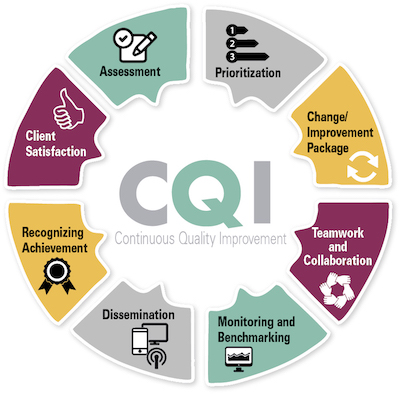Since 2006, Ciheb and the University of Maryland, Baltimore (UMB) have been developing a continuous quality improvement (CQI) approach to improve health systems and guide healthcare providers, policymakers, and program planners in more than eight countries. The results have directly contributed to the development of national strategic plans and partnership frameworks, improved service delivery, strengthened health systems, and broadened programmatic activities. The resources used to advance CQI include easy-to-use resource guides, curriculums, templates, and illustrated best practices.

Ciheb leverages the expertise of its highly qualified CQI specialists in each of the supported countries. We also work closely with other field implementation project partners and health facility personnel to achieve the following objectives:
1) Conducting assessments to identify root cause analysis and engaging leadership and CQI teams.
2) Identifying opportunities for improvement through mentorship and training of CQI teams to ensure institutionalization.
3) Using methodological approaches to plan and prioritize CQI and develop contextual change packages for improving outcomes.
4) Tracking and documenting outcomes using the state-of-the-art Ciheb CQI electronic resource tool in use in several countries.
5) Maintaining a dissemination platform through improvement collaboratives that support the spreading of CQI interventions and promoting best practice learning.
Ciheb’s hybrid CQI approach integrates a traditional plan-do-study-act approach [1] with input from learning collaboratives and real-time tracking of CQI progress using the CQI digital app.

Click to enlarge image.
Ciheb's expertise in CQI is enhanced by its other program-area work in clinical service delivery, strategic information, and health information systems, which together help to improve client health outcomes and support health workforce development. Our CQI process relies on a three-phased process that uses data feedback to create a foundation for increased positive outcomes. The three phases are preparatory, implementation, and scale up.
 Click to enlarge image.
Click to enlarge image.
[1] Plan-do-study-act (PDSA) is a commonly used approach in healthcare settings to improve outcomes. In the "plan" step, the CQI team sets an objective, sets their questions to be answered and predictions, and plans to carry out the cycle (who, what, where). In the "do" step, the team carries out the plan, documents problems and unexpected observations, and begins data analysis. In the "study" step, the team completes the data analysis, compares data to predictions, and summarizes what was learned. In the "act" step, the team determines what changes should be made and when to restart the cycle.
CQI Sections
Country Approaches

Botswana
Implementing CQI programs in Botswana

Kenya
Implementing CQI programs in Kenya

Nigeria
Implementing CQI programs in Nigeria

Rwanda
Implementing CQI programs in Rwanda


